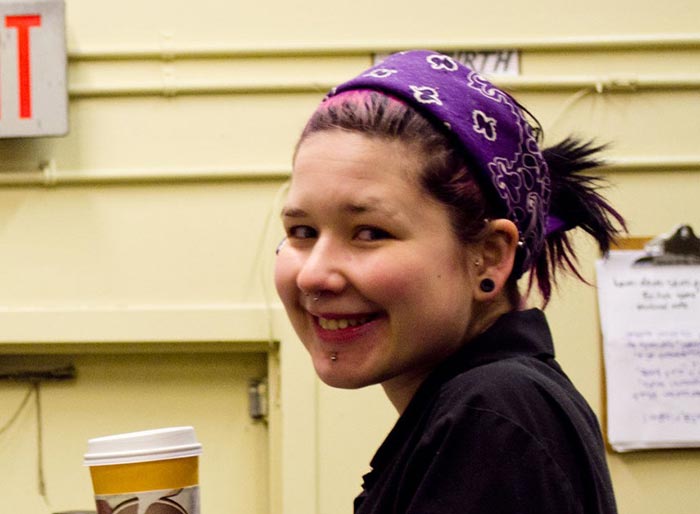Heather Giles is a Vancouver-based cook who has been working in kitchens since she was seventeen. She graduated from the Culinary Institute of Canada in 2009 and has worked as a cook at notable Vancouver restaurants Crow Bar, The Acorn, and Wild Rice, where she eventually ran the kitchen. Room’s Rose Morris spoke to Heather about her career, vegetarian food, and working with younger cooks.
Heather Giles is a Vancouver-based cook who has been working in kitchens since she was seventeen. She graduated from the Culinary Institute of Canada in 2009 and has worked as a cook at notable Vancouver restaurants Crow Bar, The Acorn, and Wild Rice, where she eventually ran the kitchen. She also recently spent two years abroad, cooking in London at The Pig and Butcher. For the BackRoom interview in the upcoming food-themed issue 40.1, Room‘s Rose Morris spoke to Heather about her career, vegetarian food, and working with younger cooks. You can read the first part of the interview with Heather in 40.1. (Pre-order the issue now at a discounted price before the issue hits the newsstands.)
Join us as we celebrate the launch of the food issue at Cartems Donuterie during the Growing Room Festival in Vancouver.
RM: What sparked your desire to become a cook?
HG: I have always had an interest in cooking, although it wasn’t until my teens that I considered it as a career. Growing up, both my parents did a lot of cooking and baking and it was just natural that the kids participate. I was always helping cook or bake something, and by the time I was around 13 I was making dinner once a week or so. The older I got, the more I cooked. I was quite lucky in the amount of freedom, but also positive influence I got from the adults around me. My parents always encouraged me to pursue food as a career despite all the drawbacks surrounding the industry.
RM: What have some of the challenges and drawbacks been for you, working in the restaurant industry?
HG: Wild Rice was hard in many ways, especially because I was so young. It had a lot of the typical restaurant problems: no money, understaffed, old and broken equipment. It was really a challenge to make do with what we had. Every day was mentally and physically exhausting, trying to get everything done with the resources and time available. But on the flip side it felt amazing to actually pull it off each time. I worked with some great people and, despite being so young, had almost complete freedom in the kitchen. It was really rewarding to be faced with an impossible task and somehow with the help of an awesome crew make it happen.
RM: You’ve mentioned that you like changing the way people think about vegetarian food. Can you talk a little more about that?
HG: I’ve always liked twisting peoples’ conception of veggie food. As a teenager it involved a lot of meat and dairy analogues but as I got older I really learned how to use vegetables to their full potential. The Acorn played a large part in that. Everything they did was so carefully thought out and well executed. They were exceptionally influential in evening the playing field for plant-based cooking. Anything on their menu could stand shoulder to shoulder with some of the best meat dishes in town. In 2013 we were part of a food competition and, despite being the only vegetarian restaurant, we won with our dish of smoked mushrooms, carrots and mushroom jus. The incredible depth of flavour we were able to achieve in our sauce really turned some heads and made people think twice about what vegetables can bring to the table.
RM: Is there a particular dish you’ve made or eaten that stands out as most memorable to you?
HG: I have been really lucky to have eaten and made a ton of great food in my life. One of the dishes I am most proud of is turnip cakes, which are a Chinese dim sum item made of grated and steamed turnips. I took a basic recipe and tweaked it to be gluten free and vegan. It was the first dish that I ever put on a menu and it was incredibly popular. It was pretty satisfying. It’s even harder to pin down the best thing I’ve eaten, but one thing that has always stuck very firmly in my mind is a lavender sorbet from Publican in Chicago. It was just so well balanced. The lavender was intense, but not too floral. It was sweet, but not sickly. The whole dish was absolutely perfect.
RM: What would your ideal restaurant look like?
HG: My ideal restaurant would probably be something simple that focuses on sourcing good quality, local food and making it as good as it can be, whether that means cooking something for 48 hours to make it as tender as possible or simply adding salt to a fresh-picked tomato. Really letting the ingredients speak for themselves has definitely become a priority to me.
RM: And finally, what would you say your biggest achievement in terms of cooking has been?
HG: I think I would have to go with being able to inspire younger cooks. I’ve been incredibly lucky to be in a position where I have been able to influence and teach new cooks in various ways. Being able to watch them learn and thrive in their own way in the industry is very rewarding. I firmly believe in cooking as a craft with the older generation passing down knowledge to younger cooks. Having someone who used to work for me message me with food questions makes me feel like I’ve done something right.














